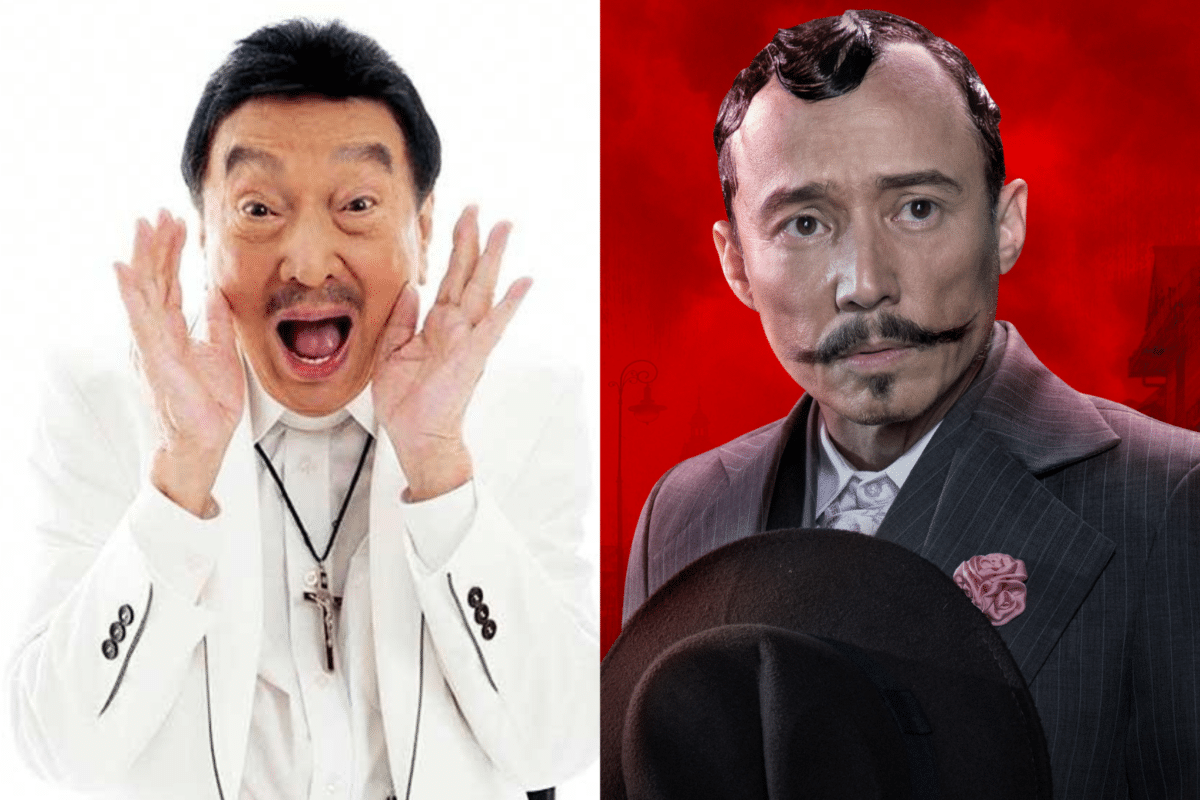
(From left) Dolphy and Epy Quizon. Images: FILE PHOTO, Instagram/@gmanetwork
Outfit, check. Top hat, check. Wavy hair, check. Twitchy mustache, spot on! But wait until Epy Quizon starts tap dancing “bodabil” (vaudeville) style while “Katy dela Cruz” sings onstage in “Pulang Araw.” A quick glance would call to mind his late father, Comedy King Dolphy whose career in entertainment took root when he was an onstage trouper during the Japanese occupation.
Fast forward to the present, Quizon would be playing the character that his father excelled in — dressing up and dancing ’40s-style. Unknown to many, he was supposed to take a break from show biz when the offer to join “Pulang Araw” and assume such a colorful character came knocking, it was an opportunity he didn’t want to miss.
Quizon stars as Julio Borromeo, a bodabil or vaudeville performer and owner of the Cine Borromeo theater, in the historical drama. His character is also the biological father of Teresita Borromeo (Sanya Lopez) and Adelina dela Cruz (Barbie Forteza).
The drama also stars Alden Richards, David Licauco, Dennis Trillo, Angelu de Leon, Ashley Ortega, Rochelle Pangilinan, Mikoy Morales, and Sef Cadayona.
Bodabil is a form of entertainment which was introduced by the Americans to the Philippines. The indigenized form of bodabil contained influences of zarzuela, komedya, and the French vaudeville, as seen in its musical numbers, dramatic skits, and short-form comedy numbers.
The actor admitted in the press conference for “Pulang Araw” that taking on the character is a way of showing his love for his father, who used to do vaudeville performances during World War 2 using his stage name, Golay. Other known performers during that time were the late actors Leopoldo Salcedo and Rogelio dela Rosa.
Quizon claimed Dolphy used to tell him about the war, when they would be in the middle of a performance when an air raid alarm would set off, and they would immediately head to a shelter inside the theater together with the audience. Afterwards, the show would go on as usual.
“Noong pinakita sa akin ‘yung character description at concept nito, sabi ko, ‘I want to be part of this,’” he said. “Malapit ito sa puso ko dahil ang tatay ko ay isang mananayaw ng Bodabil. At siyempre pinagdaanan ng tatay ko ang giyera, diba? Naikwento niya sa akin. So, isa po itong proyekto na talagang malapit sa puso ko.”
(When the character description and concept were shown to me, I said that I wanted to be a part of this. This is close to my heart because my father is a Bodabil dancer. My father experienced the war, right? He told stories of it to us. So this is one of the projects close to my heart.)
Meanwhile, in a “Fast Talk with Boy Abunda” interview on Thursday, August 1, Quizon said he hoped that no comparisons would be made between himself and his father.
“How can I say no to a vaudeville actor during World War 2 which, kwento ‘yan ng tatay ko sa’kin? When I saw [the role], I’m in… Huwag niyo akong ikumpara sa tatay ko dahil iba ‘yung tatay ko,” he said. “Nakakatakot kasi alam mo agad na ikukumpara ako sa tatay ko eh. So ngayon pa lang sinasabi ko sa inyo, huwag niyo akong ikumpara. Napakagaling n’un.”
(How can I say no to a vaudeville actor during World War 2 which was a story of my father to me? When I saw the role, I’m in. Don’t compare me to my father because he is different. It’s scary because I knew that I would be compared to my father. So moving forward, I hope no comparisons would be made. He was really good.)
Quizon also pointed out that “Pulang Araw” is a drama that “shows a glimpse” of the Philippines’ history, saying it’s an important time to look back at our past to move forward.
“We have to look back at our past for us to go forward. ‘Pulang Araw’ shows us a glimpse of our history, of what happened pre-war and during the war, it’s not just about the bodabil [kundi] ang pinagdaanan ng mga Pilipino sa kamay ng mga Amerikano at Hapon (but it’s also about what Filipinos suffered under the hands of the Americans and Japanese),” he said.


